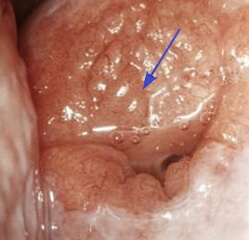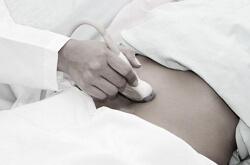Vaginismus: causes, treatment
 Vaginismus is a convulsive contraction of the vaginal muscles and pelvic floor. The muscles, compressing the vagina and muscles, lifting the anus are contracted, which excludes the possibility of a normal sexual intercourse. This is often the cause of virgogamy( virgin marriages), which sometimes can last for years. So, vaginismus: causes, treatment - the topic of discussion for today.
Vaginismus is a convulsive contraction of the vaginal muscles and pelvic floor. The muscles, compressing the vagina and muscles, lifting the anus are contracted, which excludes the possibility of a normal sexual intercourse. This is often the cause of virgogamy( virgin marriages), which sometimes can last for years. So, vaginismus: causes, treatment - the topic of discussion for today.
Symptoms of the disease
This problem is quite common, and from the age it does not depend. Like any disease, this disorder varies in intensity. Muscle spasms can sometimes be so strong that access to the vagina overlaps completely, then it is impossible to even insert a finger into it, let alone the penis. In an easier form, any attempt to initiate copulation causes pain of varying intensity. There is no decrease in desire, no decrease in the degree of reaction to preliminary caresses, or lack of capacity for orgasm. That is, all the natural needs are preserved, only the physical possibility to make intercourse is excluded.
Vaginismus in some cases can occur against the background of violence, painful defloration, coarseness of the partner when trying to deflow. More often, however, the causes of vaginismus cause a little more. They are mostly of a psychological nature. The disease sometimes arises with the husband's indecisive behavior and in the presence of a certain character store of the wife: resentment, suspiciousness, anxiety. In addition, in the past, most patients had various fears since childhood( fear of pain, water, darkness, height, etc.).It is the fear of pain that often becomes obtrusive, combined with emotional tension. Along with the usual complaints of vaginismus, women also experience sleep disorders, periodic depression. Many patients express violated psychosexual development with a transformation of the sexual role. Often, marriage with vaginism is preceded by long friendship from early childhood, prolonged companionship, and sometimes long petting.
A woman with vaginismus often characterizes her husband as "ideal": caring, loving, gentle, tactful, compliant. Sometimes the husband himself gives his wife the role of a spoiled child, fulfilling all her desires and moods unquestioningly. At the same time, the long absence of defloration not only does not worsen the relations between the spouses, but gives the wife a privileged position of the person, who requires increased sensitivity. This contributes to the aggravation of the disease.
Degrees of vaginismus
Vaginismus usually occurs with the onset of sexual activity. Spasmodic contraction of muscles arises from fear of pain during defloration, but sometimes this condition occurs suddenly, unexpectedly for the patient at the time of a particularly painful defloration. Usually tactful husbands do not insist on completing the act. Then the next attempt is repeated. Further vaginismus is manifested even during gynecological examination.
Specialists distinguish three degrees of vaginismus:
I degree - a painful reaction occurs immediately after the introduction of the penis into the vagina or instrument during gynecological examination;
II degree - muscle spasms occur at any touch to the genitals or even while waiting for a touch to them;
III degree - spasms occur at one mental presentation of a sexual act or the thought of a gynecological examination.
The absence of defloration is hard experienced by both spouses, although in many cases, interpersonal relations do not deteriorate much, and sexual adaptation is achieved through petting or vestibular coitus. Women with vaginism even experience orgasm while doing this, but they still turn to the doctor because of feelings of inferiority or the desire to give birth to a child.
Diagnosis
Vaginismus is important not to be confused with psedovoginizmom, when pain when trying to coital, convulsive spasms and defensive reaction are secondary. They arise from the defeat of the genysegmental component( congenital developmental defect, colpitis, adhesive process and the presence of gynecological diseases that make the sexual intercourse sharply painful).
In addition, vaginismus should be distinguished from koitofobii - fear of pain during sexual intercourse, which prevents its implementation. In this case, the process is not accompanied by an involuntary contraction of the muscles of the vagina.
Phenomena similar to vaginismus are caused by incorrect actions of partners due to lack of knowledge of the anatomy of the genitals. It is enough to make a one-time correction, in order to restore the sexual function.
Causes, treatment of vaginismus
Sometimes women suffering from vaginismus in mild form, resign themselves to their problem, agreeing sometimes to sexual relations through pain. The reported incidence of this problem is on average between 3% and 5% of women. In many of them, vaginism causes a secondary problematic, which is psychological in nature. It depends on the personality, but more often it comes down to fear of starting sexual intercourse, not looking at the normal functioning of reproductive systems. Nevertheless, if the psychological complex does not reach critical strength, then in women with vaginism, sexual arousal arises and develops normally. They can even reach orgasm in the absence of a direct physiological fusion. Similarly, the secretion glands work fine, which moisturize the vaginal opening.
With a disease like vaginismus, treatment can not be fast. The doctor needs perseverance and patience. It is unacceptable to conduct primitive "psychotherapy" in the form of ridicule, reproaches and threats. The main method of treatment is rational psychotherapy, as well as conducting a special training aimed at eliminating the fear of copulation of involuntary muscle contraction associated with this fear. To facilitate research and training, the patient is offered to stretch and relax the abdominal muscles. This entails relaxation of the pelvic muscles, which are their antagonists.
Patient during the sessions it is important to convince of the painlessness of first inserting one finger into the vagina, then two or more. Gradually, the patient is injected with thicker dilators. In order to reduce the feeling of fear, a woman is sometimes recommended tranquilizers( tazepam, phenazepam).



